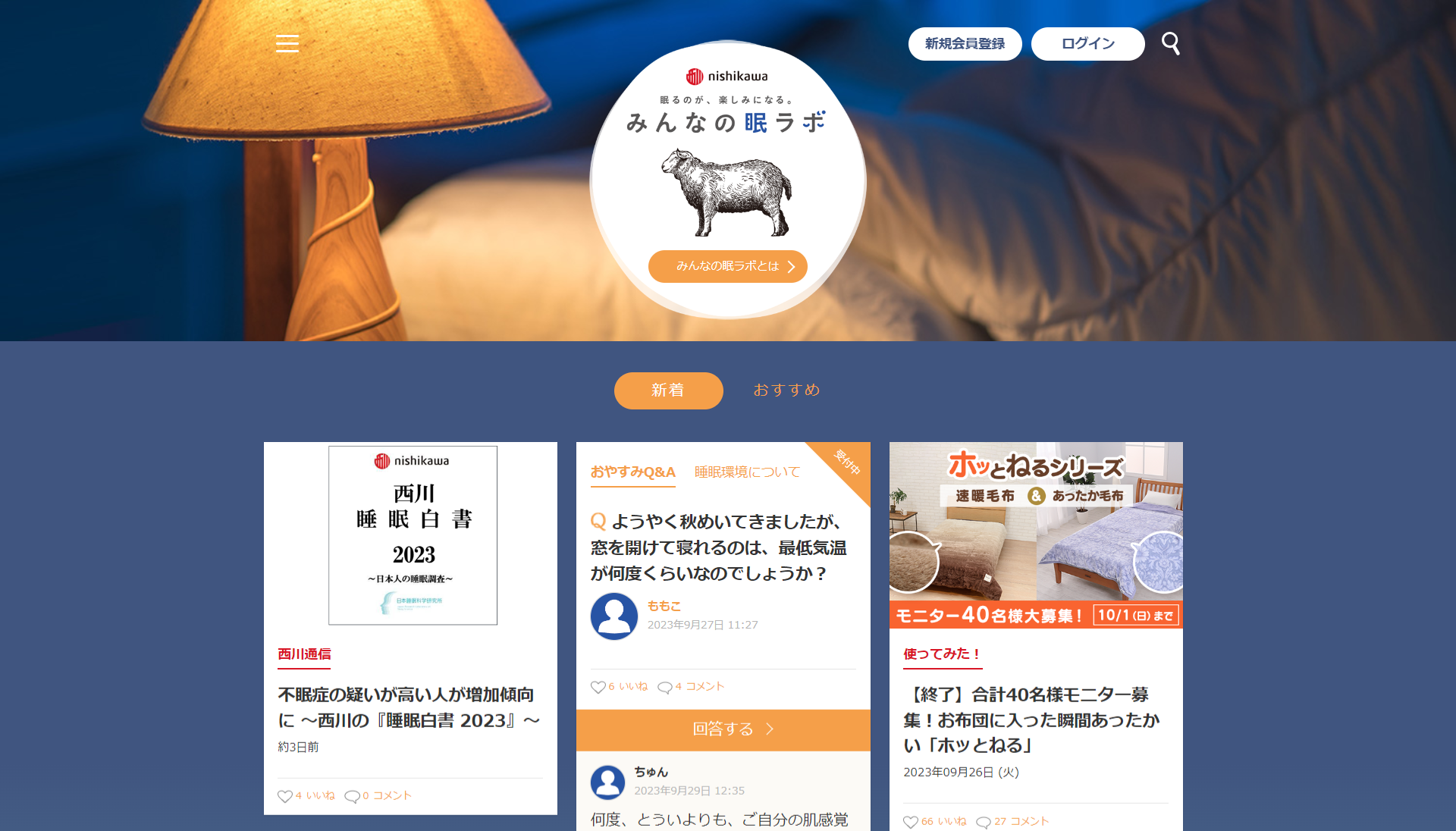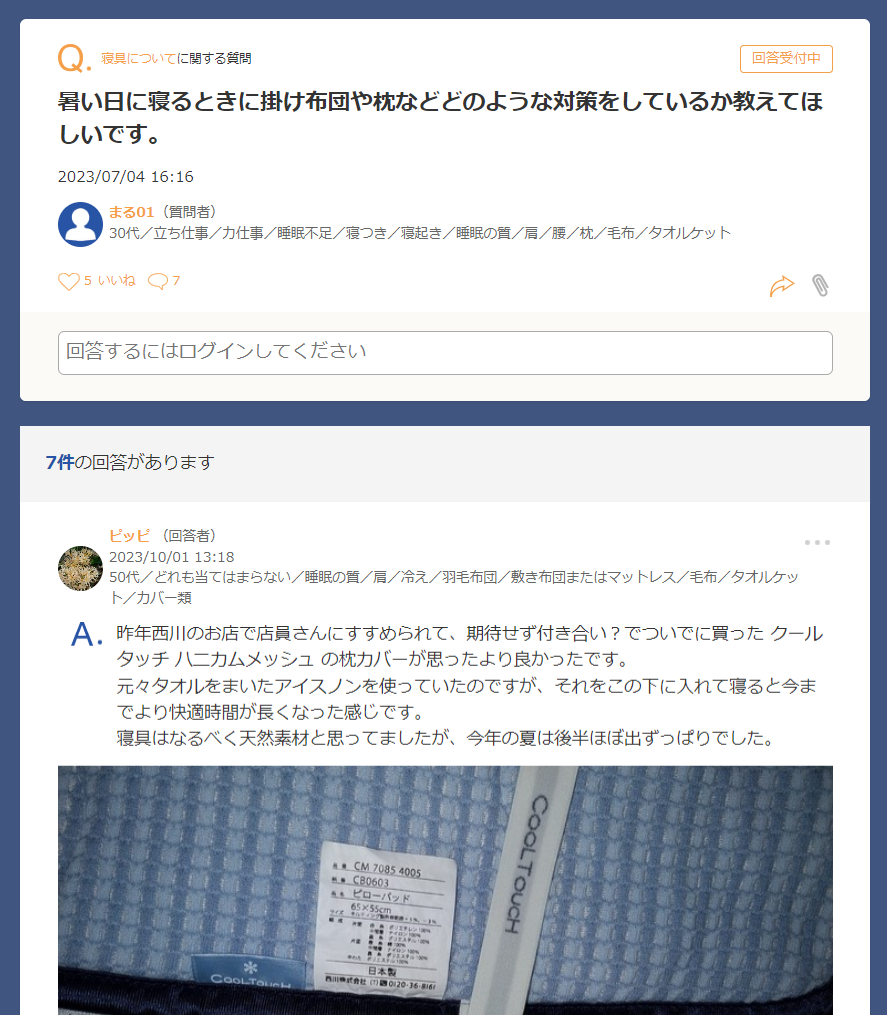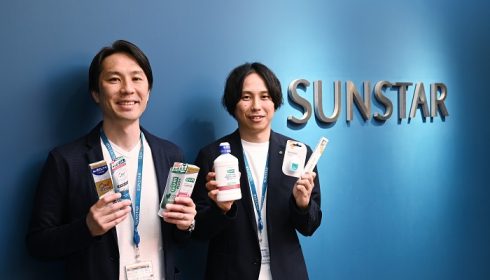What NISHIKAWA Co., Ltd., which has been in business for 457 years, did digitally to find out what "customers really think".
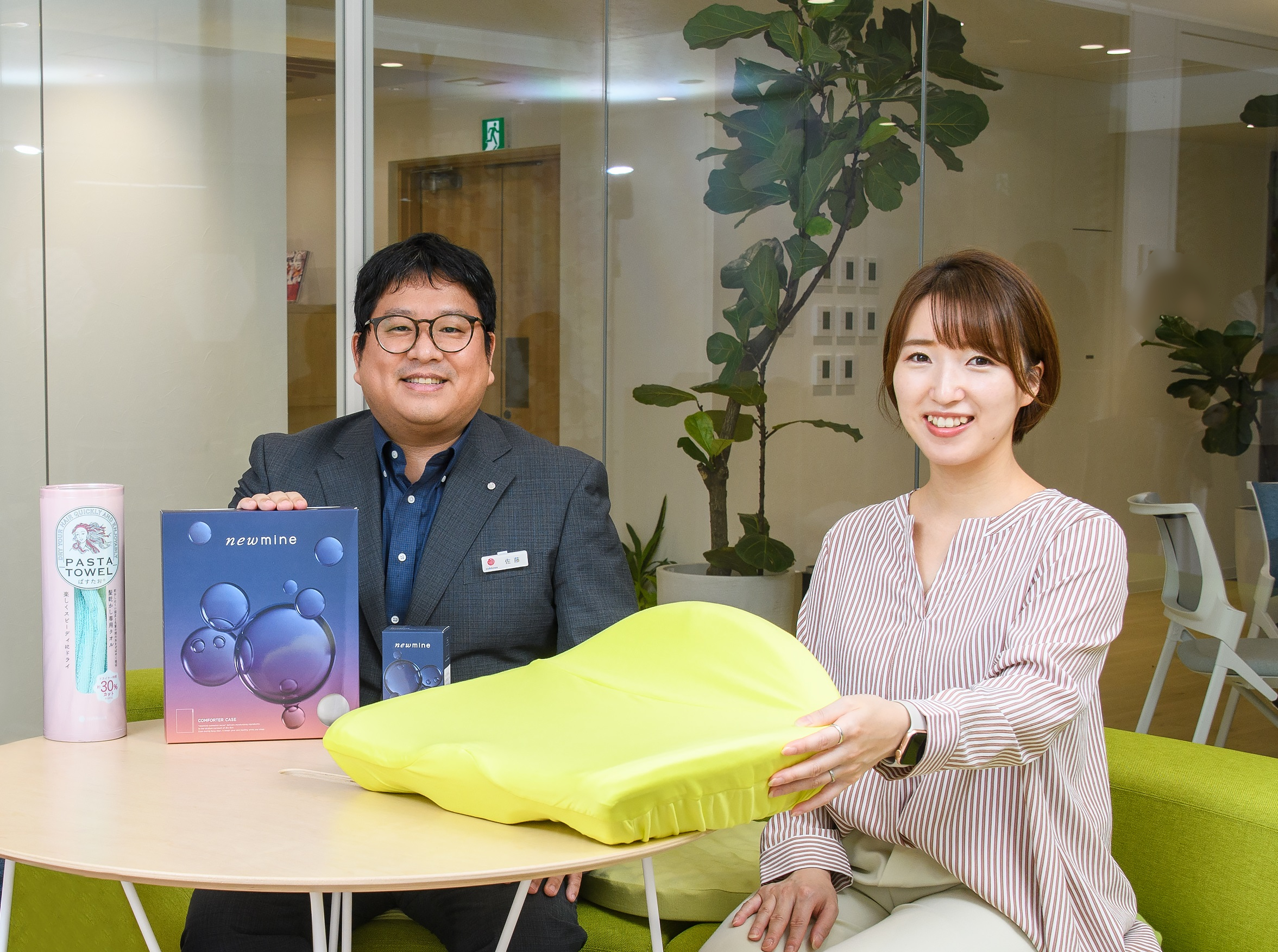
Fan marketing, D2C, and other terms vary, but more and more companies are now trying to connect directly with their customers. In this series of interviews with partner companies that practice partner relationship management (PRM), including communities, we will clarify "why direct connection is necessary" and "what companies need to change accordingly. The interviewer is Tatsuo Ishii, Executive Advisor of Kao Corporation, who has long been involved in brand marketing at Kao Corporation.
This issue features NISHIKAWA Co., Ltd., a 457-year-old bedding manufacturer. The company's sleep-themed community site, "Sleep Lab for Everyone" ("Sleep Labo"), has grown steadily since its launch in 2021, with approximately 8,470 members and an active user rate of approximately 16% as of early October 2023.
What is unique about the company is that it is conspicuously utilizing the opinions of customers who have made contact with the company through its community website in various ways, involving other departments. I have the impression that this is slightly different from the previous JAL, where the focus was on "how to expand outside the company," such as brand recognition and image enhancement through word of mouth.
What kind of efforts are you making to connect with customers, listen to their opinions, and make the most of them? We spoke with Konosuke Sato and Satsuki Nagao of the Marketing Strategy Department, who have been members of the "Sleep Lab" since its launch.
Basically a BtoBtoC company.
--Nishikawa has a physical store and is developing a B-to-C business selling bedding and pillows in person. In other words, you already have a point of contact with your customers. What was the background behind the creation of the "Sleep Lab" as a digital point of contact?
【Sato】 You just said "B to C," but in fact, the basis of our business is "B to B to C." Our wholesale customers are of course the department stores, but what we call the "Nishikawa Chain" is also the "community bedding specialty stores. Our wholesale customers are not only department stores, but also "bedding specialty stores in town," which we call the "Nishikawa Chain. Therefore, we do not seem to have direct contact with our customers.
Originally, we believed that if we made good products, our customers would buy them, but in recent years, with the overflow of information and the increasing number of competitors, this is no longer the case. We need to know more about our customers and communicate more about ourselves. It was in this context that we decided to start directly managed stores in 2004.
But in 2020, we entered the Corona disaster, and a situation arose where we could not serve customers at the store. Therefore, a new department was created called Digital Strategy (at the time), to which Nagao and I were assigned. We conduct various digital communications using our website and Social media, etc. We began to consider a community website as "a place to listen to our customers directly and to deliver our voice to them.
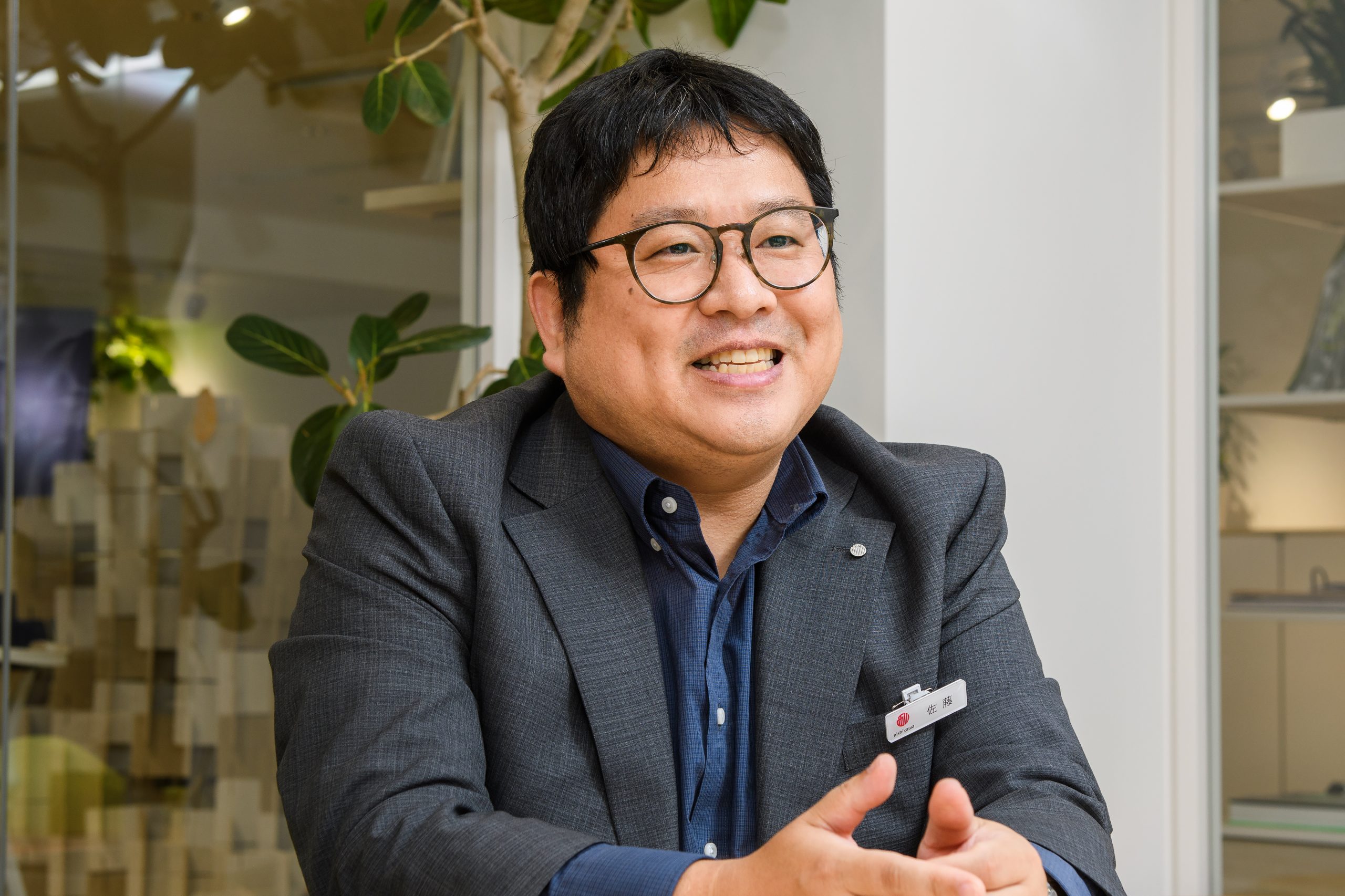
NISHIKAWA Co., Ltd. Konosuke Sato, Manager, Marketing Strategy Department, Innovation and Marketing Strategy Division
--Do you feel that connecting digitally has a different meaning from the real contact point, the directly-managed store?
【Sato】 Even though we have directly managed stores, there are only a few of them. They are also biased toward the Kanto region and do not have contacts throughout the country. With digital technology, we can connect with customers beyond such geographical restrictions.
In addition, bedding is not replaced very often. Mr. Ishii probably does not remember when he bought his current futon. In order to get customers to choose again when it is time for their next purchase, it is important not only to connect with them but also to keep connecting with them. This is another reason why we thought a community site would be a good idea.
--I think that even though there is a directly managed store, it is not so frequently visited by a single customer. What do you think about this point from your perspective as a person with sales experience?
【Nagao】 To be honest, it is not so easy to say that we frequently visit department stores and specialty stores. I suspect that even among customers who visit mass merchandisers, there are few who know what each company is offering.
In such a situation, I think the Web connection is very important. Word of mouth from customers is also important to spread the appeal of brands and products. I feel that it is important to have a place to connect not only in the store but also on the web.

NISHIKAWA Co., Ltd. Satsuki Nagao, Marketing Strategy Department, Innovation and Marketing Strategy Division
Sleeping Communities, Not Futons
--Is the ultimate goal of the community to get people to buy bedding?
【Nagao】 It is of course great when a customer purchases a product as a result of the community, but I also believe that there is a "beyond" to it. I think it would be great if, after the purchase, the customer could spread the word through the community or through word-of-mouth sites and spread the enthusiasm even further.
【Sato】 As I mentioned earlier, I think it is important to have continuous contact with people. There are not many people who think about bedding every day, unless it is for work. Usually, people think about changing their bedding when they have a problem or when they move to a new house. It is important that they remember us at that time.
Even if a customer chooses something other than ours after much consideration, we think it's fine if it leads to a better life. However, we would like them to at least include our products as one of their choices. I believe that our main purpose is to create a point of contact and a place for people to be reminded of their choices.
It is easy to feel a sense of familiarity with people you see frequently, and it is easy to talk to them about any problems you may have. I believe that creating a similar atmosphere is the most important aspect of a community. In this context, as Nagao mentioned earlier, I think it is also possible for customers to form a circle among themselves and begin to interact with each other.
According to our survey, even long-time mattress users who we consider to be "Nishikawa fans" have a surprisingly low level of awareness when it comes to down, saying things like, "Nishikawa-san, you have down mattresses, too. And vice versa. We believe that having these people interact with each other in the community will be a good opportunity for them to get to know us better.
--Your community site is "Sleep Lab" and not "Pillow Lab" or "Futon Lab". Why did you choose to focus your community on sleep?
Our tagline is "Sleep well, live well. Our tagline is "Sleep Well, Live Well. Our tagline is "Sleep well and live well." We hope that a good night's sleep will energize you for tomorrow, and that it will help you live a full life. The item of futon is positioned as a means to achieve this.
Our company was founded in Omihachiman during the Muromachi period (1333-1573), and at that time we dealt in tatami mats and mosquito nets. Since then, we have a history of changing the products we handle each time in response to the changing needs of the times. What we have always wanted to offer is "a good night's sleep," and in this day and age, the futon is the tool to achieve that.
Therefore, it is not out of our nature to be a "sleep community. Another reason is that we thought it would be easier to communicate with people if we refer to sleep as including bedding rather than focusing on bedding as the topic.
-In designing a community, it is important to make it easy for the customer's voice to be heard. While it is difficult to get people to speak out on the theme of futons, sleep is something we experience every day. Sleep is a daily experience, and there is more to it than that, such as the elimination of fatigue. This makes it easier for the voice to come out.
The "real problem" that I realized only after connecting with the company.
--Do you learn from your customers' interactions within the community, or from Nishikawa's conversations with them, as opposed to educating them about your products and sleep?
【Nagao】 Of course. For example, if you look at the Q&A section where customers ask each other questions, you will notice that "this is what customers are worried about! We who deal with sleep every day can think that it is too natural for us to ask questions.
For those of us who deal with sleep every day, these are things that are so commonplace that we don't even think of them as questions. But in fact, what is really troubling the customer may be hidden in such things. We are very grateful to be able to confirm such things without overlooking them.
From there, we can apply the information to the contents of our homepage or Social mediaby saying, "If this is what is bothering you, let's try to communicate it carefully by incorporating it into the product pages or special feature pages.
We are also able to utilize the content of Social mediafor POP in the storefront by expanding it to the sales department.
--I like that there is a movement that does not stop at being a marketing and public relations department.
【Nagao】 Recently, in addition to our own efforts, we have been receiving an increasing number of inquiries and proposals from sales departments, etc., such as, "We would like to conduct a survey on this product," or "Can we ask people to use this product and use their reviews directly on our in-store POP?
We have even recruited monitors for our "Sleep Lab" and invited them to appear on a TV shopping program. The condition for recruiting monitors is that they must be able to appear on TV after using the product. We thought that many people would be reluctant to participate, but we were surprised by the turnout.
--Perhaps it is because of his support that he is willing to show his face. This is a proof of the trust that has been built between Mr. Nishikawa and his customers through "Sleep Lab.
【Nagao】 I really appreciate it. It is reassuring to know that our base is made up of fans, and it gives us a sense of security.
--There are a number of companies that operate communities, but the reality is that only the department in charge of digital is doing it in a small way, and other departments often do not care about it. It is wonderful that Nishikawa-san is well recognized within the company.
【Nagao】 But it was only in the third year that we finally started doing this. At first, no matter how many times I went around saying, "You can take surveys," or "We can recruit monitors," the response was, "Hmmm, if we get the chance. The number of members outside the company may have been increasing steadily, but when I asked people inside the company, they said, "Sleep Lab? What's that?
Only recently have we received an increasing number of inquiries, such as, "If we can get real customer feedback, we would like to take a survey," and "We would like to have our customers use the system as monitors. We are now able to connect the customer feedback obtained through the "Sleep Lab" to various departments within the company, and vice versa, and have various departments utilize the "Sleep Lab". I feel that such a good cycle has been established, and I believe it is because of the customer feedback.
--By the way, do you have any examples of using such feedback in product development?
【Nagao】 We have yet to develop a product from scratch based on customer feedback. For example, we would like to develop products based on customer feedback after conducting surveys such as, "Do you like cushions that are hard or soft? We have received requests to conduct questionnaires in advance and utilize the results in product development, such as asking about posture or back pain.
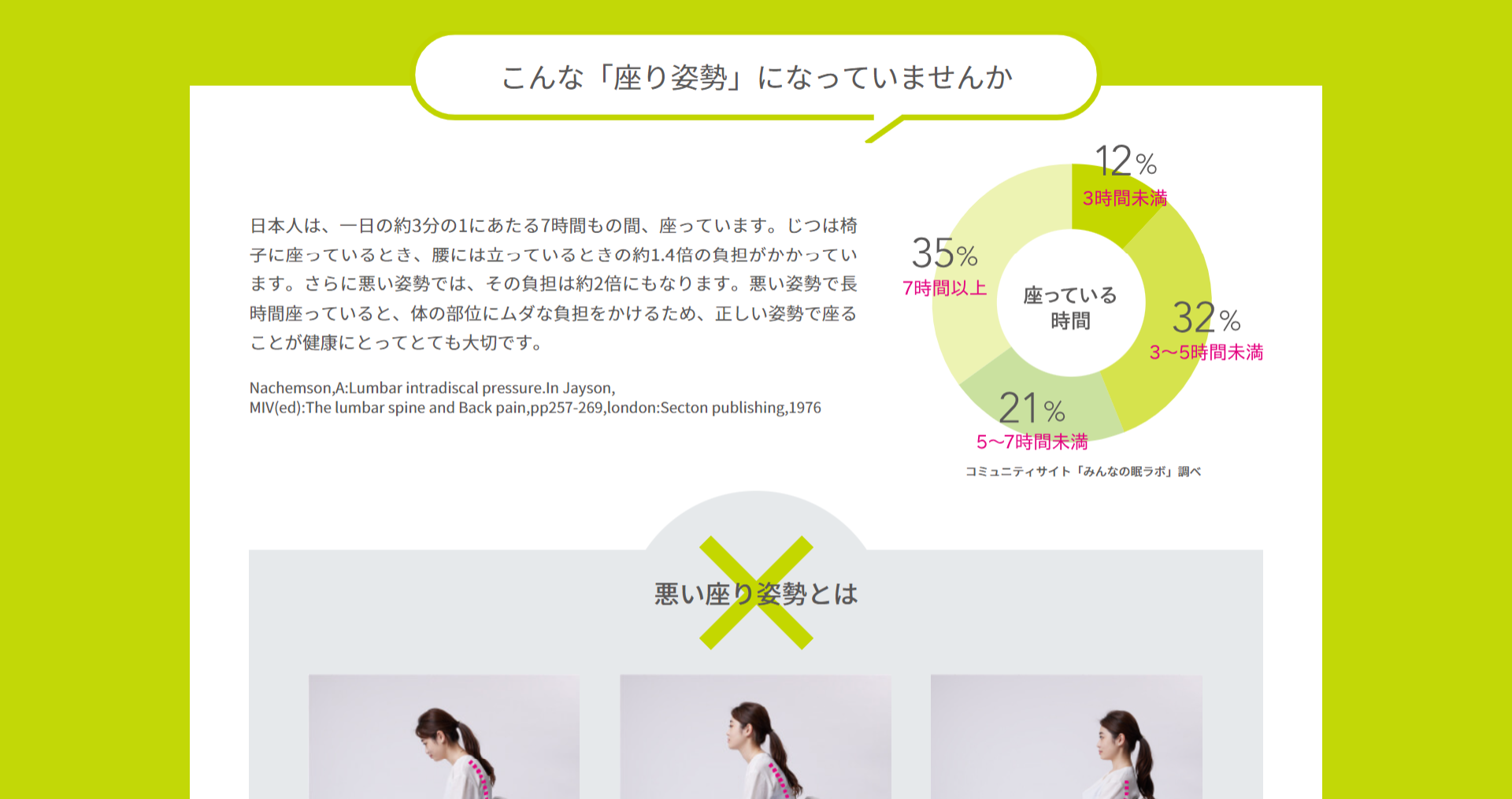
From the "Keeps Cushion" product website. The Sleep Lab was used to identify needs.
Demonstrate internal value early and increase allies
--What was the catalyst for the spread of internal recognition?
【Nagao】 One time, one of our departments used the system on a trial basis and got a really good survey. We were able to hear what the customers really thought, not just what they thought, and this led to a case in which they said, "We can use this data for our next product development project.
That department became the starting point, and it spread like this: "Oh, if you want to do something like that, you should consult with the Sleep Lab, which is run by Digital Strategy, to see if it can be done.
Now there are so many "we can get this, we can get that" cases. It's a happy scream, I guess you could say.
【Sato】 Like relationships between people, communities are relationships and take time to nurture. If it is hard to see the results, people may say, "It costs money, let's quit" before the community takes root. We had been talking about how important it was to deliver internal value in a visible form at an early stage, even before the launch of the project.
As a short-term KPI, we wanted to emphasize the value of "being able to hear directly from customers" and "being able to take surveys" as one of the KPIs.
As Nagao mentioned, such recognition has recently become much more widespread within the company, but this was not the case at first, of course. Therefore, for the first six months to a year after the launch, we adopted a policy of creating value that could be easily felt within the company. We thought that if we did not provide tangible value early on, the original community-based policies, which were based on medium- to long-term goals, would not continue.
We are only in our third year, so we still have a long way to go, but through some of the measures we have implemented, some people happened to become aware of the possibility of doing something together at the Sleep Lab. I don't know if that is the essence of the community, but we will continue to work on it. I don't know if that is the essence of a community, but I think it is important for us to face our fans not only in some departments but also in the entire Nishikawa area in order to continue.
--If they don't understand the value internally, the investment won't continue. You thought about this from the beginning, and then thought through how to provide early feedback.
【Sato】 Building a relationship is not something that can be done overnight, so I was very careful about that. I think it is difficult to get immediate results even if you want to.
--I think that's what has led to all of these things now.
【Sato】 I think the personality of Nagao, who is in charge of the field, contributed to this, making people feel that he is "easy to talk to" and "might be able to do something for us. If people felt that it was somehow difficult to ask for help even if they had an idea, it would have been difficult for the service to spread.
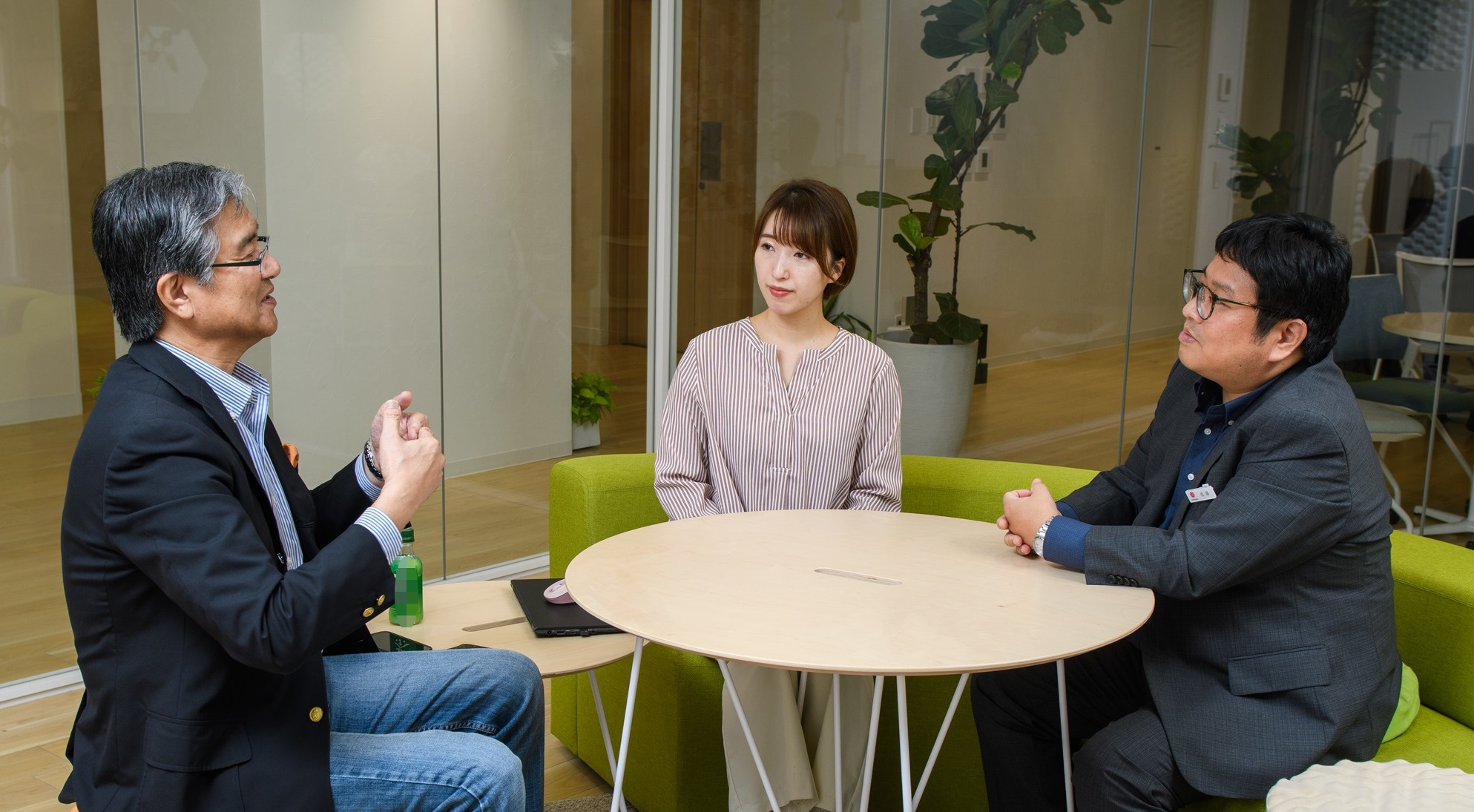
Tatsuo Ishii, Executive Advisor, eLife (pictured left), who shares the importance of providing value internally in community management.
Teachings of "retail thinking" that have lived on since pre-digital times.
--I dare to ask one negative thing, but your company has always had directly managed stores. Each of them must have faced customers and raised information about them through daily reports. Was there any opposition to the digital department trying to connect directly with customers?
【Sato】 This concern was not limited to the community, but was also something we had to take into account when we launched our directly managed stores.
Since that time, our consistent stance has been "How can we make the best use of customers' voices in our products and services? To this end, we naturally refer to the opinions of our wholesale customers, but that alone is not enough. It is also necessary to connect directly with them and listen to them.
About 15 years ago, we did not yet have a directly managed store and were completely in the position of a wholesaler, but at that time, the company repeatedly told us to "think like a manufacturer and retailer.
Until then, we had been thinking about what buyers thought our products were worth, but that alone was not enough. If our products did not sell well, our retailers would not be able to stock them. We need to think about what kind of value our customers are getting from our products.
In other words, the speed is too slow as it is now. eLifeWe need a place where we can connect directly with customers, and that is why we set up our directly managed stores. What was previously possible only in real life is now possible online.
Since the community is set in this context, there has been no backlash against ...... from the field.
--From the stage of creating directly managed stores, we have been feeding back the information we have absorbed to our clients and communicating with them that "our connecting with our customers is also beneficial to all of you. So you are saying that you already had an understanding of the situation?
【Sato】 That's right. For example, the pillow section used to be located at the back of the bedding section. We said, "There should be more demand for pillows, so we want them to be placed on the aisle," but we could not get them to change their position because of the customary way of selling pillows.
So, we thought, why not try an experiment at our directly managed store? If the customers responded well, we could make such a proposal to our customers. As a result of such repeated communication, we are now seeing an increasing number of customers placing their pillows sales areas along the aisles.
In other words, directly-managed stores are also a place to conduct experiments. And now, the place for such experiments has been extended to the online "Sleep Lab".
--I see, I understand now. So what would you like to do in the future?
【Nagao】 We talked about monitors earlier, but now it seems that we are getting too many requests to do the opposite. I feel that the issue is that the community has become a place for this purpose.
This may lead to an increase in the number of people who are not real fans but are just looking for prizes. If those people become fans, then of course there is no problem, but there is a concern that the community will cease to be a community of fans. I think we need to think more about planning content that customers can genuinely enjoy and participate in.
We once had a willow project that was my idea. We asked fans to submit willow poems on the theme of sleep, and the winning poems were displayed as POP in our stores. Since I was originally assigned to the sales department, I wanted to somehow connect the community site with the sales floor and create an opportunity for people to visit the sales floor.
I can't say that this project was that successful, but now is the time to go back to the basics and create an opportunity for people to visit the storefront, even if only a little, and not stop at the Web. I would like to focus on new project contents for this purpose.
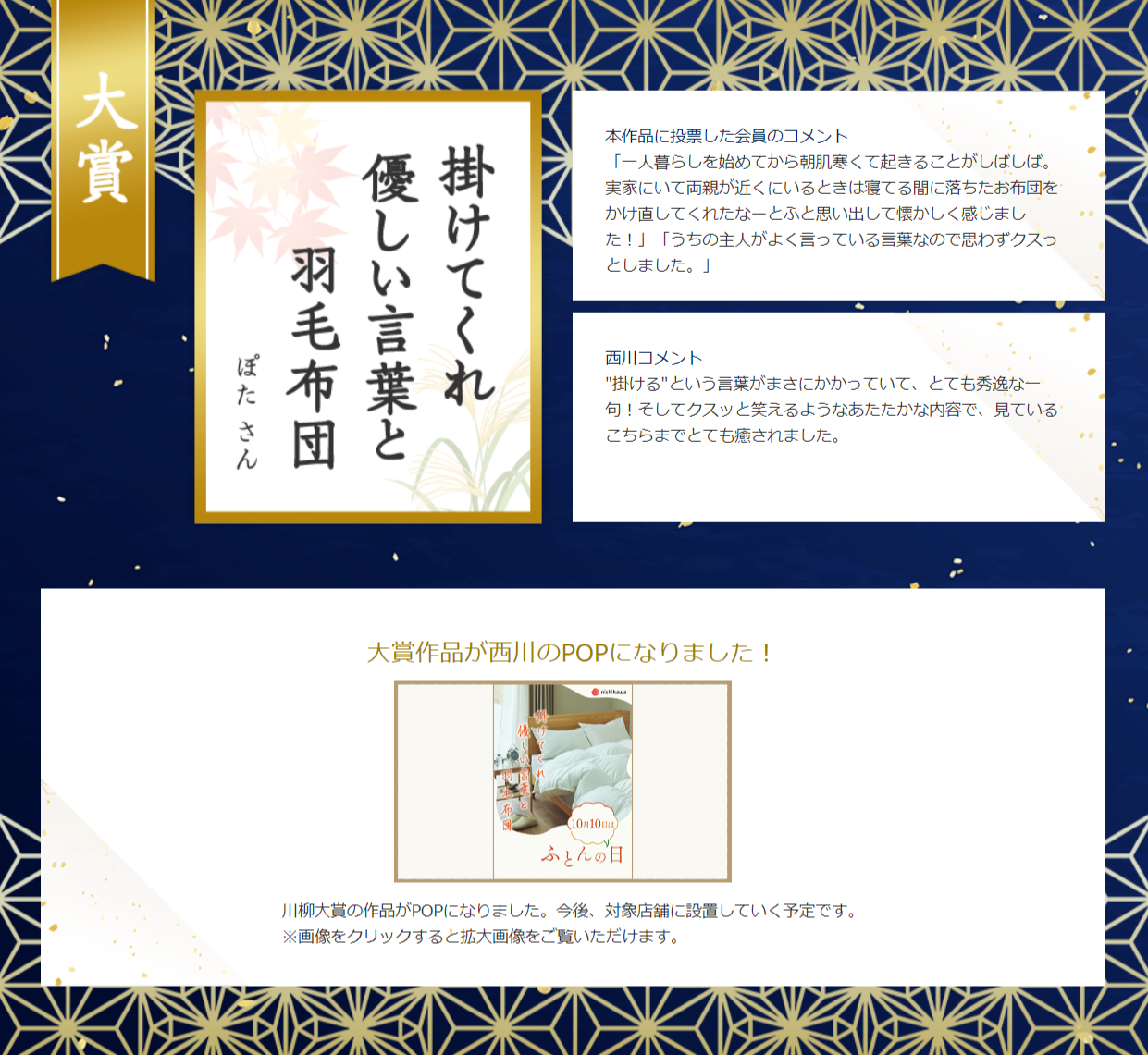
Willow project. The grand prize winning entry will be made into POP and installed in the store.
Fans eventually become the strongest salespeople.
-I have heard you speak at one point, but I would like to ask an additional question at the end. On the bottom right of the "Sleep Lab" page, there is a button that jumps to the sales staff hiring page.

Banner area at the bottom of the top of the "Sleep Lab for Everyone" website
【Nagao】 I didn't realize you looked into such details (laughs). It all started with a consultation from the human resources department. They were looking for ways to increase mid-career recruitment, and the content of the consultation was to see if we could successfully push it out on our digital strategy website and Social media.
We came up with several ideas on the spot, one of which was this measure. Sleep Lab" is a group of Nishikawa fans. So we agreed that it would be good to have one here.
--I thought it was a good idea. The people who gather at the "Sleep Lab" are people who are interested in sleep. If they have acquired the correct knowledge and are fans of Mr. Nishikawa, it is possible that they would be willing to work at a nearby store.
【Sato】 I asked the human resources manager what kind of people actually work at the company. The answer came back that they are "people who are interested in sleep and health and have a sense of mission," so we agreed that if that was the case, they would be a good match for our site and the people who come to the Sleep Lab.
I once spoke with someone from the Scandinavian Living Tool Store. That company recruits employees once or twice a year for their customers. That is why nearly 80 to 90% of the employees are former customers. Because these people are employees, the content they want to communicate resonates directly with customers. When I heard that story, I thought, "That's amazing.
I thought, "That's great." After all, passion is important. Because you can feel the passion of the person delivering the message, it moves the hearts of those who receive it. In terms of a community, it would be ideal if the fans could do this with each other. But in the sense of raising the enthusiasm of employees first, I thought, "That is certainly possible.
--when I first saw it, I thought, "Why here?" I thought, "Why here?" But no, no, no. When I thought about it, I realized that this is the essence of community: to build an equal relationship with customers and to create something together. I thought it was wonderful to come up with this kind of idea. I think it is proof that the community is properly designed in terms of what it is, how it interacts with its customers, and what the customers would be happy to see happen as a result.
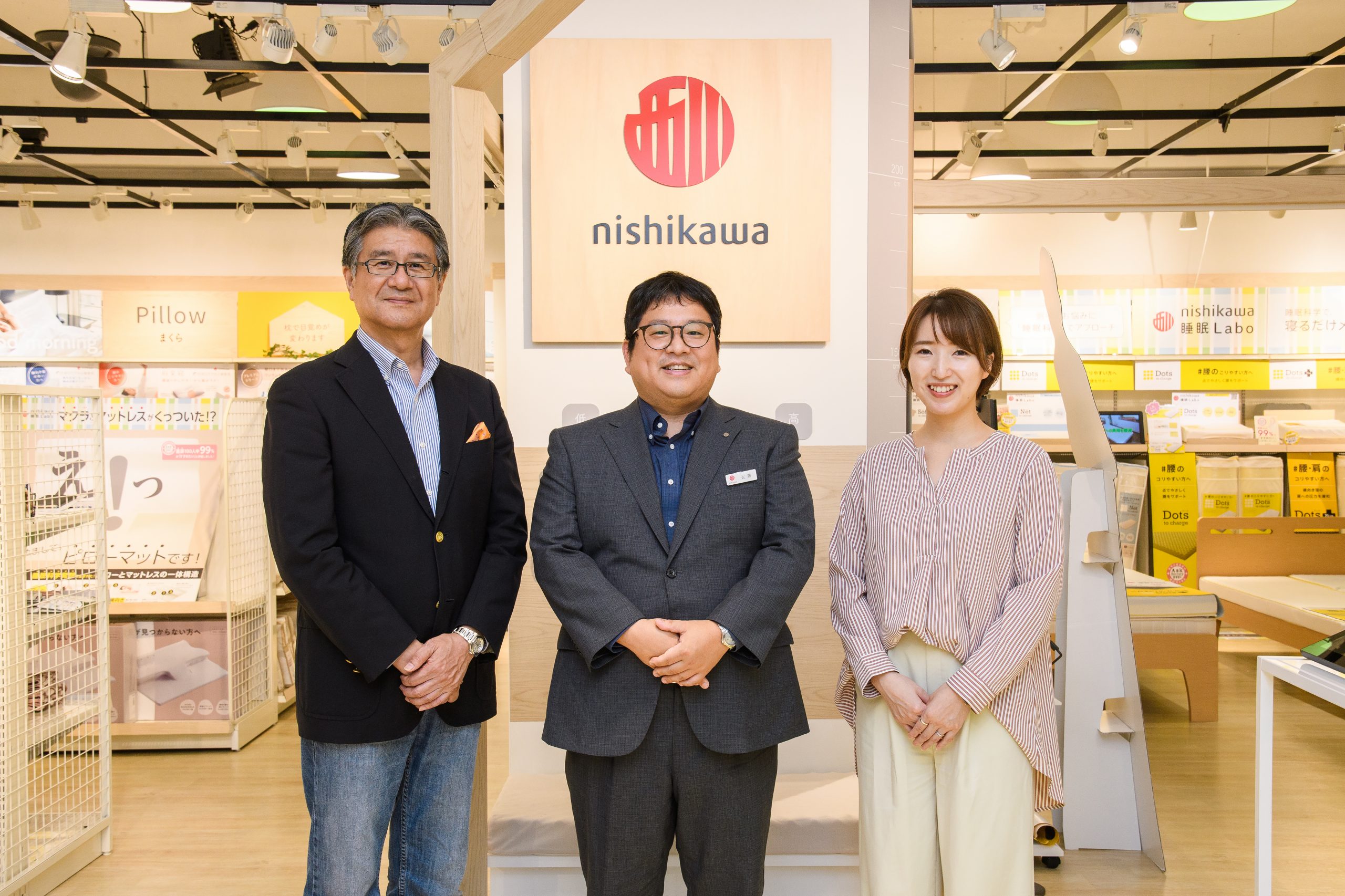 In the second installment of "Visiting PRM Practice Companies," we visited NISHIKAWA CO., LTD..
In the second installment of "Visiting PRM Practice Companies," we visited NISHIKAWA CO., LTD..What impressed me most was the phrase, "It is important not only to connect, but also to stay connected. I understood what he said about not only sending out information, but also creating a relationship with customers by having them answer questionnaires and feel free to ask questions, so that manufacturers can become aware of customers' problems that they have overlooked because they are too commonplace, and then utilize those problems in articles and product development.
In addition, since the community is based on a medium- to long-term premise, it is important to have people within the company understand the value of the community in terms of gaining investment. Sleep Lab has been able to provide value by directly listening to customers who do not come to the stores from the very beginning, and by linking this to improvements in the sales area, it has been able to provide support not only to directly managed stores but also to stores in general, which is a point to be learned. (Interviewer: Tatsuo Ishii)
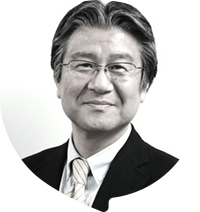 Tatsuo Ishii, Executive Advisor, eLife Inc. Tatsuo Ishii, Executive Advisor, eLife Inc.He served as manager of a number of brands for 14 years at Kao Corporation, where he also launched Agience as a new business. In 2003, he established the Digital Marketing Center, where he was involved in the planning and operation of web-based strategies and established the Digital Marketing Center as the head of the center. In 2017, he was appointed as Executive Advisor for eLife Inc.. He is a part-time lecturer at the Graduate School of Business Administration, Waseda University, a Marketing Meister of the Japan Marketing Association, a member of the Digital Media Committee of the Japan Advertisers Association, the Chairman of the Brand Experience Jury of the Dentsu Advertising Awards, and an auditor at C Channel K.K. He is a leading marketing expert. |
(Composition: Atsuo Suzuki)

